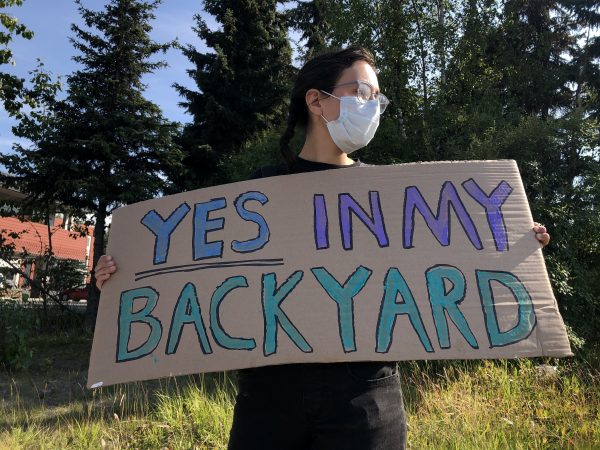
Federal officials are cautioning the Municipality of Anchorage that its plan to buy properties for a substance treatment center and housing for people experiencing homelessness may not fall within the allowable use for CARES Act funds.
The U.S. Department of Treasury Office of Inspector General met with members of the Assembly and the Berkowitz administration Wednesday afternoon. Municipal attorney Kate Vogel, who has provided legal guidance on the project, said the issue was about creating permanent housing and treatment resources with the emergency relief funds.
“They did not know many of the details about our particular purchase, but did have concerns, specifically concerns about whether or not the buildings that we purchase need to be temporary,” Vogel said.
On Tuesday, the Assembly approved $12.5 million of CARES Act funding for the purchase of the three buildings in downtown, Midtown and Spenard to be used for housing and homelessness resources. They also approved $10 million for the purchase of the Best Western Golden Lion to become a substance treatment center. That $10 million comes from the proceeds from the sale of Municipal Light & Power.
No decision was made about the allowable use of the $12.5 million in CARES Act money the assembly approved for the building purchase on Tuesday. Vogel said the Inspector General told them to take it up with the Treasury.
“The advice that we received was, ‘Have a conversation directly with Treasury before the money leaves muni coffers.’ And we’re certainly prepared to do that,” she said.
The Inspector General’s office apparently acknowledged that the lack of clarity and changing guidance on allowable uses for CARES Act funding has caused frustration for local governments.
Wednesday’s meeting was scheduled after the Inspector General’s office received complaints from the community about the use of the money. Vogel said it seems like Anchorage was singled out.
“We are aware of many communities throughout the United States who are buying hotels for the purpose of housing their homeless. IG’s office had not ever apparently investigated any of them,” she said. “So that’s part of the conversation that we’ll be having with Treasury.”
Assembly Chair Felix Rivera, who was also in the meeting, said the Inspector General’s office told city officials that they hadn’t received complaints from those other communities.
”My guess is that this is probably one of the first meetings that they’ve had like this,” he said.
Even with Assembly approval, the city still has to go through the process of inspecting the buildings and negotiating prices. Berkowitz Chief of Staff Jason Bockenstedt said regardless of the Treasury’s final decision, it will be awhile before the $12.5 million in CARES Act money is spent.
“We have not expended any funds and we don’t expect to expend any funds for the foreseeable future,” Bockenstedt said. “We have time available to have those conversations (with the Treasury Department) while still moving forward with our due diligence. And hopefully here in the near future we will get a final word from Treasury.”
Rivera said even if the Treasury doesn’t allow the CARES Act money to be spent on the property purchases, he still wants to see it spent on different homelessness resources.
“If in the end, Treasury says, ‘Sorry, you can’t use the money this way,’ then that frees up $12.5 million for us to consider using it another way,” he said. “We have to move forward with these projects. We’re going to do our job, make sure that we are being fiscally responsible. And we’re going to protect the lives of the most vulnerable in our community. We can get both done.”
Kavitha George is Alaska Public Media’s climate change reporter. Reach her at kgeorge@alaskapublic.org. Read more about Kavitha here.





